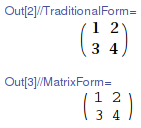I am not sure how to explain it, but whenever I compute something in Mathematica, the output always spits back the result in a Mathematica language as opposed to easy-to-read equations.
It's troublesome if my answer contains multiplies of parentheses and if my matrix is large.
Is there a way to make Mathematica display answers in "$\LaTeX$" form? So for instance, if i compute
RowReduce[{{1, 0}, {0, 1}}] How do I make it spit out a square matrix instead of giving me back {{1, 0}, {0, 1}}?



{{1,0},{0,1}}//MatrixForm$\endgroup$TeXForm.TeXForm[{{1, 0}, {0, 1}}]gives: $\left( \begin{array}{cc} 1 & 0 \\ 0 & 1 \\ \end{array} \right)$ $\endgroup$